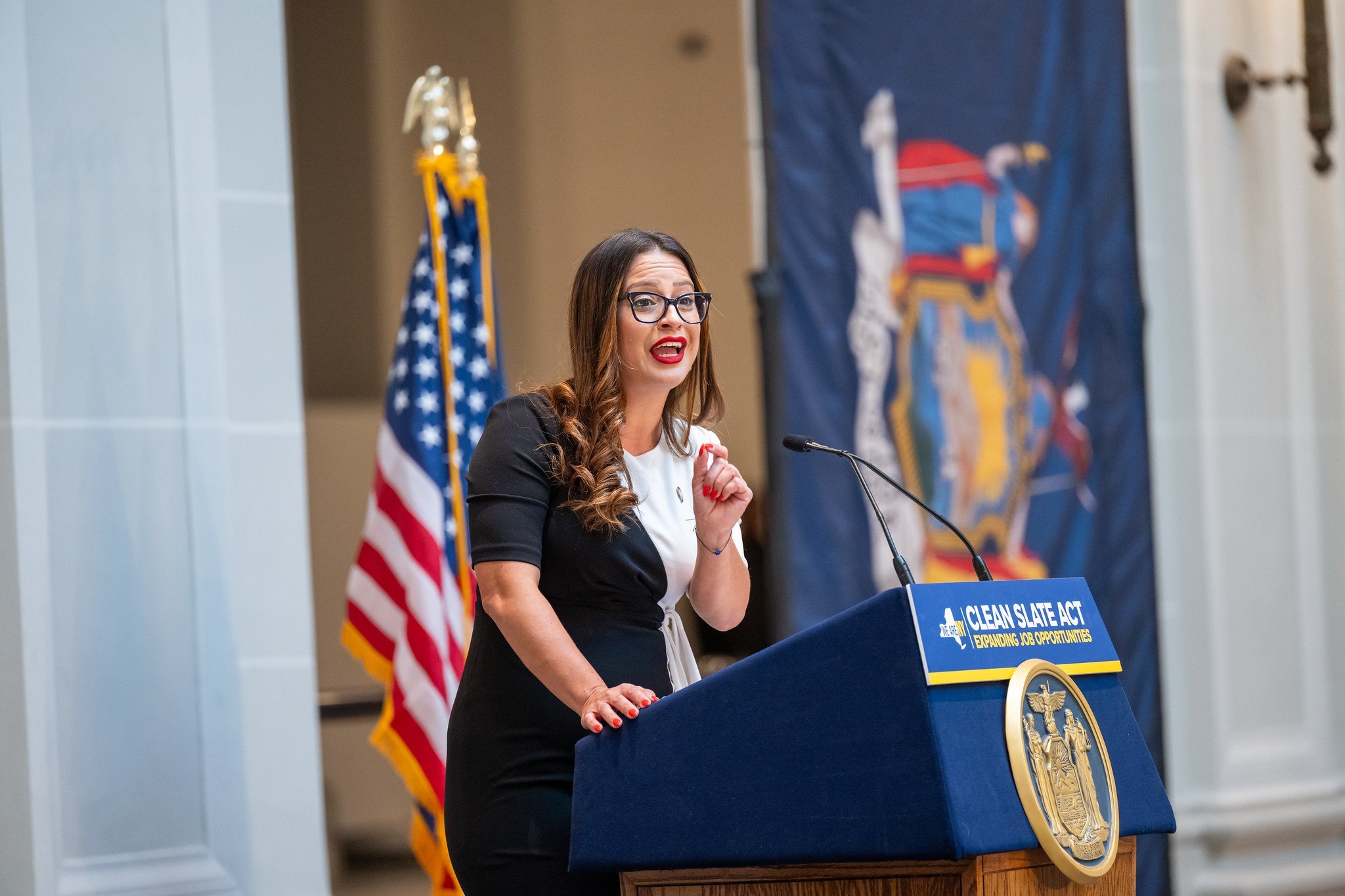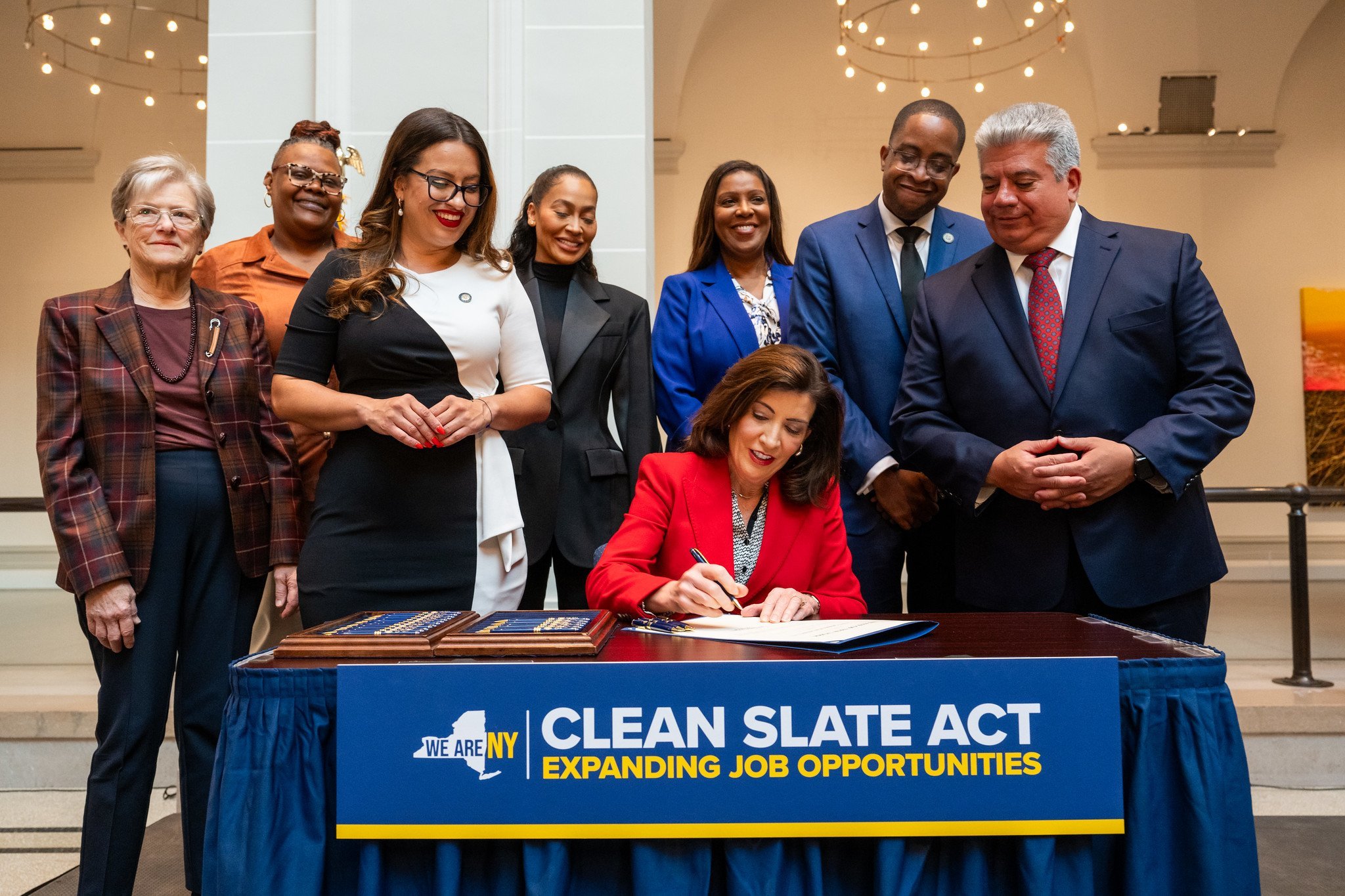Clean Slate Act takes effect
/Queens Assemblymember Catalina Cruz, who sponsored the Clean Slate Act. The law, which allows for the automatic sealing of certain criminal records, went into effect over the weekend. File photo by Susan Watts/Governor Kathy Hochul’s office
By Jacob Kaye
Millions of New Yorkers will soon see their criminal convictions automatically sealed after a bill known as the Clean Slate Act took effect over the weekend.
The legislation, which was signed into law by Governor Kathy Hochul in 2023 after years of debate over the bill in the legislature, officially went into effect on Saturday, creating the opportunity for the approximately 2 million New Yorkers with criminal records to shield their convictions from employers, landlords and schools.
The bill’s supporters, which include criminal justice advocates, lawmakers and business leaders, say the Clean Slate Act will put an end to the perpetual punishment some New Yorkers experience when they are denied access to housing, jobs and educational opportunities because of their past convictions. They also say the law will give a boost to the state’s economy, opening up employment opportunities to millions of people.
Under the law, misdemeanor convictions will be automatically sealed three years after someone has completed their sentence – including parole or probation – and felony convictions will be automatically sealed after an eight year waiting period.
The clock on the waiting period will be paused for New Yorkers if they were to face new charges. Should they be convicted of those new charges, their path toward automatic sealing of their original conviction will be eliminated.
Not all convictions will be eligible for automatic sealing – most Class A felonies and sex crimes will remain on New Yorkers’ records.
The bill, which was introduced in the Assembly by Queens lawmaker Catalina Cruz and in the Senate by New York City mayoral candidate Zellnor Myrie, knocked around Albany for several years before it finally was pushed across the finish line.
Despite its broad support, it proved to be a relatively controversial bill.
The legislation was first introduced in 2019, 2021, and again in 2022, falling short of passage each year.
But each year, support for the bill seemed to grow. In 2023, the year of the bill’s passage, the Clean Slate Act picked up support from several of the country’s largest financial firms, the New York City Bar Association, the city’s district attorneys, a wide array of nonprofit organizations and a majority of lawmakers in Albany
But it wasn’t without its detractors.
Republican lawmakers in the state’s legislature claimed the bill supports “criminals” over "victims," Rockland County Assemblymember John McGowan said from the floor of the Assembly on June 9, 2023, the day the bill passed.
“Time goes by, don't do it again, and we're going to seal your record,” McGowan said. “What message are we sending in this state? It's the wrong message, is the answer.”
New York became the 11th state in the U.S. to have an automatic criminal record sealing law on the books when the Clean Slate Act went into effect over the weekend.
Not only were the doubts about its passage in previous years, but also about how the final version of the bill would look.
Governor Kathy Hochul signed the Clean Slate Act into law in November 2023. The law, which allows for the automatic sealing of certain criminal records, went into effect over the weekend. File photo by Susan Watts/Governor Kathy Hochul’s office
Originally, the bill allowed for a shorter waiting period for New Yorkers to see their convictions sealed. There also wasn’t a carve out the automatic sealing of Class A felony convictions.
The final version of the bill also allowed for law enforcement and prosecutors to access and unseal criminal records in a number of situations including; if prosecutors are pursuing a new criminal case, if it relates to the scope of a law enforcement investigation, if an entity is required under state or federal law to conduct a fingerprint-based background check and if a licensing officer is processing a firearm license application.
The changes to the final version of the Clean Slate Act were enough to win over the governor, who didn’t fully back the bill in the years before its passage.
When the State Senate and State Assembly overwhelmingly approved the measure in June of last year, Hochul said she would only sign the bill into law if she felt it struck a balance.
“I did want to get a version of Clean Slate that actually deals with the efforts to make sure that people have a second chance – I think that's going to help with recidivism,” the governor said at the time. “But we also have to be smart about it and find out – are there opportunities to find out if there is a record in another state, for example? And has someone else been convicted of a crime related to sexual assault or something dealing with children?”
“So, there's areas we wanted to fine tune,” she added.
Hochul signed the bill into law in November 2023.
On Saturday, Hochul said in a statement that she was “proud” to work with the legislature to “craft a common-sense compromise that lets law enforcement monitor criminal activity while law-abiding individuals have a second chance.”
“As we work to improve public safety and expand economic opportunity for all, the Clean Slate Act will play a critical role in helping New Yorkers find jobs, housing and opportunities in education,” Hochul added. “Starting today, individuals who have paid their debt to society, stayed out of the criminal justice system and are looking for a fresh start will begin to benefit from this landmark legislation.”
And while criminal justice reform advocates celebrated the Clean Slate Act going into effect over the weekend, some warned that further protections are needed in order to realize all the benefits of the law.
On Monday, the Legal Aid Society called on Hochuul to sign into law the Maintaining Criminal Record Confidentiality Act, which was passed by the legislature over the summer and sent to the governor’s desk on Friday.
The bill would prevent employers, landlords and others from requiring New Yorkers to disclose criminal records that they have received through the Division of Criminal Justices Services’ Personal Record Review, which can sometimes include sealed and confidential records.
“The Maintaining Criminal Record Confidentiality Act will ensure that New Yorkers’ confidential and sealed records remain just that: confidential and sealed,” the Legal Aid Society said in a statement. “It will prevent employers and landlords from circumventing existing protections for New Yorkers with arrest records, including the Clean Slate Act.”
“New Yorkers should be able to access employment and housing opportunities without having to disclose confidential and sealed information,” the public defense firm added. “New Yorkers with past arrest records are no less capable or deserving of the opportunity to work and access housing.”





